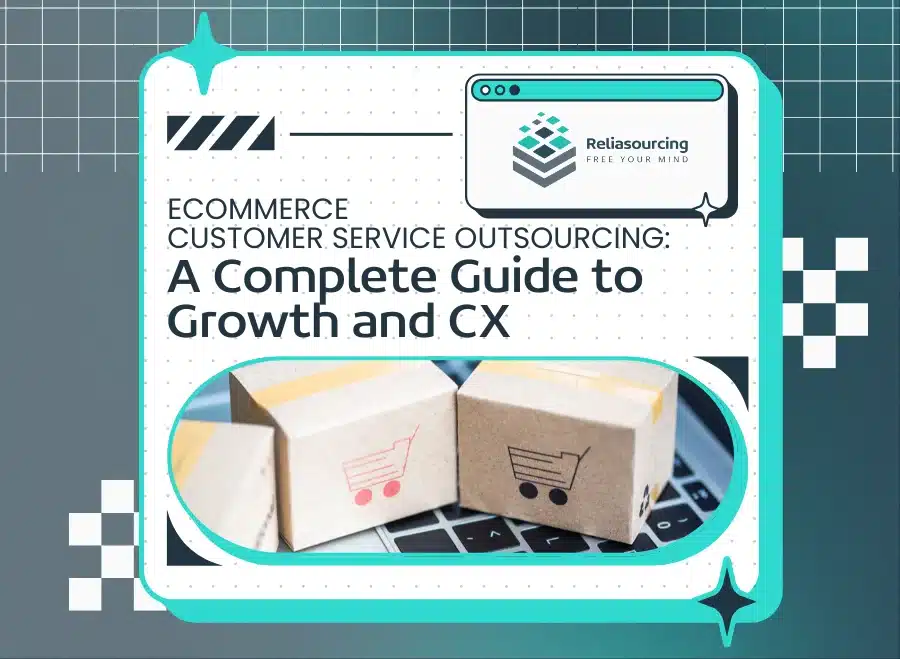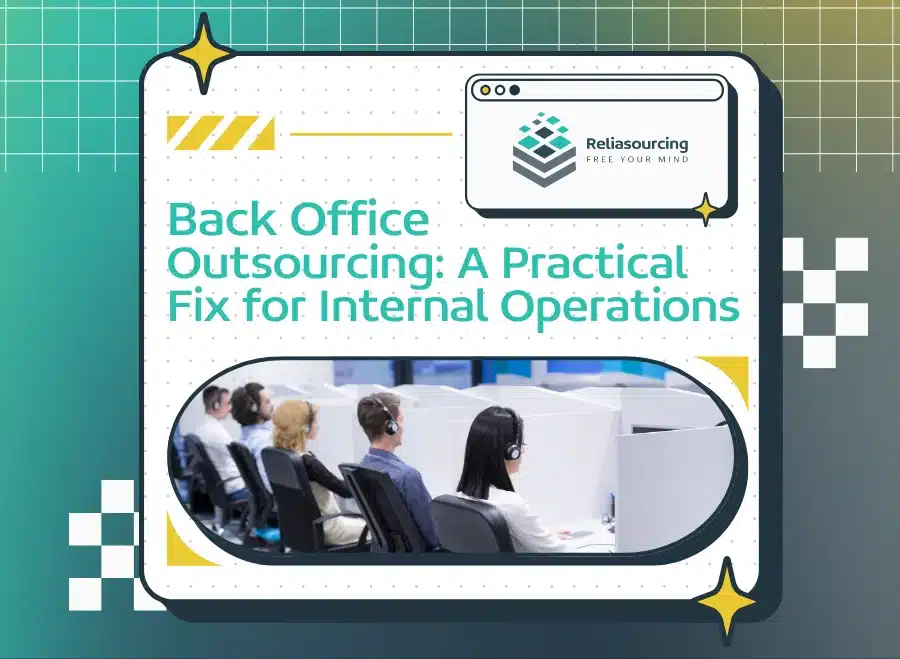The story of eCommerce is one of swift development. Just two decades ago, online shopping was a novelty, something people experimented with occasionally but still approached with caution. Today, it stands as a dominant force in global retail, but customer expectations have evolved dramatically alongside this growth. In the early years, customers were more forgiving of delays or inconsistent service. The focus was on convenience: being able to shop from the comfort of home. However, as giants like Amazon, Alibaba, and Shopify-powered brands set new standards for speed and responsiveness, customer experience (CX) became the battleground where brands differentiate themselves.
Nowhere is this truer than in customer service. According to PwC, 32% of customers would stop doing business with a brand they loved after a single bad experience, showing that customer service is a back-office function that clearly drives loyalty, revenue, and long-term growth. The challenge, however, lies in scale. For growing eCommerce businesses, maintaining consistently high service standards is difficult. Customer inquiries arrive through multiple channels: email, live chat, phone, and increasingly, social media. Coupled with ticket volumes spiking overnight during promotions or holiday sales, customers shop across time zones, meaning 24/7 support is no longer optional but expected.
That’s why eCommerce customer service outsourcing has emerged as a solution. Outsourcing is about leveraging specialized talent, advanced tools, and scalable operations to deliver customer service that keeps pace with business growth. In this guide, we’ll explore what outsourcing means for the eCommerce industry, its benefits and costs, how to manage seasonal surges, and best practices to ensure outsourcing drives customer satisfaction and business growth.
What is eCommerce Customer Service Outsourcing?
At its simplest, eCommerce customer service outsourcing means entrusting an external provider with some or all of your customer support operations. But in practice, it’s much more than handing over a set of tasks. The service focuses on building partnerships with specialists who combine skilled talent, industry knowledge, and advanced technology to deliver seamless customer experiences at scale.
Core Functions of Outsourced eCommerce Support
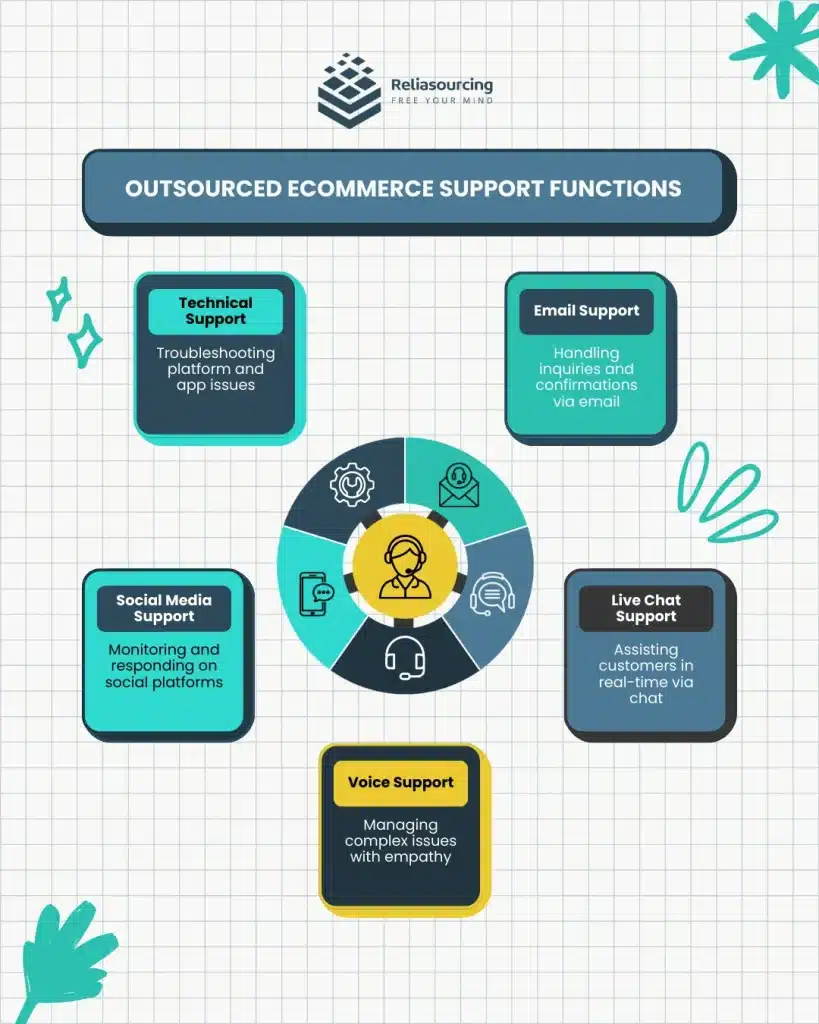
Outsourcing providers typically cover a wide range of customer service functions, including:
- Email Support
- Handling inquiries about product availability, returns, and refunds.
- Confirming orders, shipping updates, and delivery timelines.
- Managing complaints or escalations that require detailed written explanations.
- Live Chat and Messaging Support
- Assisting customers during checkout to reduce cart abandonment.
- Providing real-time answers about sizing, product details, or promotions.
- Integrating with platforms like Shopify or WooCommerce for instant order lookups.
- Voice Support
- Managing complex or sensitive issues that demand empathy.
- Handling escalations such as fraud disputes or high-value orders.
- Offering sales support for customers who need reassurance before purchasing.
- Social Media Support
- Monitoring brand mentions across Twitter, Instagram, TikTok, and Facebook.
- Responding to direct messages and comments in real time.
- Protecting brand reputation by addressing public complaints swiftly.
- Technical Support
- Troubleshooting issues with eCommerce platforms (Shopify, Magento, BigCommerce).
- Helping customers with payment or login issues.
- Assisting with integration queries for connected apps.
Technology as the Backbone of Outsourced Support
Modern outsourcing providers are powered by technology that ensures efficiency, transparency, and scalability. For example:
- Zendesk provides omnichannel ticket management, allowing all customer conversations to be tracked in one place.
- Gorgias, built specifically for eCommerce, integrates with Shopify to automatically pull order details into support tickets, speeding up resolutions.
- Salesforce offers advanced CRM capabilities, including AI-driven recommendations and predictive analytics.
- Five9 enables cloud-based contact center operations with intelligent call routing and real-time analytics.
Combining these tools with human expertise allows outsourcing partners to improve customer service by creating a system where customers receive faster responses, managers gain real-time visibility, and businesses benefit from consistent service delivery.
Benefits of Outsourcing eCommerce Customer Service
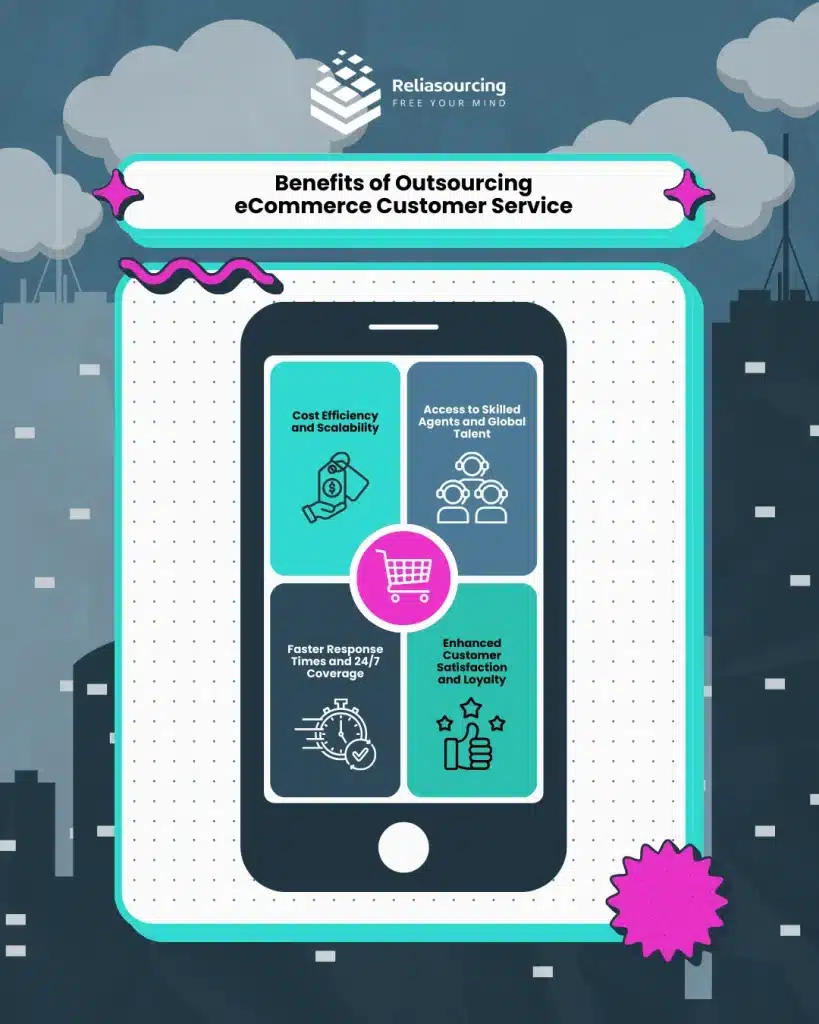
Outsourcing is often viewed through the narrow lens of cost savings, but there are many reasons why a company would outsource. While cost efficiency is undoubtedly a benefit, the true value lies in how outsourcing enhances customer experience and drives revenue. Let’s explore the benefits in depth.
1. Cost Efficiency and Scalability
Running an in-house customer support team involves significant fixed costs: you need to recruit, train, and retain staff; you have to invest in office space, equipment, and technology licenses; and management overhead and continuous training add further expenses.
Outsourcing replaces these with a flexible, variable-cost model. You pay only for the services you need, when you need them. If your ticket volume doubles during the holiday season, your outsourcing partner can quickly scale up. When demand falls, you can scale down without carrying the financial burden of underutilized staff.
Flexibility can mean the difference between profitable growth and operational bottlenecks for small and medium-sized businesses.
2. Access to Skilled Agents and Global Talent
Customer service outsourcing hubs such as the Philippines provide access to a highly skilled workforce. Agents are known for their strong English proficiency, cultural compatibility with Western markets, and natural empathy, ensuring customer interactions feel authentic and brand-aligned.
Additionally, outsourcing partners invest heavily in training. Agents are taught not just to resolve issues but to engage in proactive service, anticipating customer needs, upselling relevant products, and reinforcing brand loyalty.
3. Faster Response Times and 24/7 Coverage
Customers no longer tolerate waiting hours—or worse, days—for a response. Outsourced teams provide round-the-clock availability, ensuring no customer is left waiting due to time zone differences. Combined with AI-driven ticket routing, inquiries are resolved faster, boosting satisfaction and preventing lost sales.
A branding technology client outsourcing customer service to Reliasourcing saw CSAT scores climb from 3.7 to 4.7 in under a year. More importantly, the engagement generated over $1.2M in upsell revenue and $2.6M in retention-driven revenue. All these points contribute to the company’s enhanced capability to address its customers whenever they need it.
4. Enhanced Customer Satisfaction and Loyalty
Customer satisfaction predicts long-term business success, so outsourcing providers implement strict quality assurance standards, ensuring every interaction meets professionalism, accuracy, empathy, and tone benchmarks.
This consistency builds trust, which, in turn, fosters loyalty. And while loyal customers do spend more, the real value of fostering loyalty is how these customer become brand advocates, amplifying your reputation through word-of-mouth and social proof.
Seasonal Hiring and Volume Flexibility in Online Retail
One of the most challenging aspects of running an eCommerce business is managing demand spikes since, unlike traditional retail, where foot traffic can be somewhat predictable, online demand can surge unpredictably due to promotions, viral campaigns, or seasonal events.
The Problem with Seasonal In-House Hiring
Businesses that try to manage surges with in-house hiring face significant obstacles:
- Recruiting and onboarding temporary staff takes time.
- Seasonal hires may lack commitment, leading to inconsistent service.
- Training short-term employees is resource-intensive, and knowledge is often lost after the season ends.
- Permanent staff are left underutilized in off-peak months, driving up costs.
How Outsourcing Solves the Problem
Outsourcing partners are built for elasticity since they maintain talent pools that can be scaled up quickly during peak demand. New agents can be onboarded within weeks, trained on brand guidelines, and integrated seamlessly into the support team.
In addition, the model ensures consistent service quality regardless of volume, allowing customers to continue receiving timely, empathetic support even when ticket volumes triple.
Volume Hiring Strategies for Black Friday, Christmas, and Other Major Shopping Events
Peak seasons like Black Friday and Christmas create unique support challenges:
- Order status inquiries. Customers want constant updates on shipping and delivery timelines.
- Returns and exchanges. January becomes a peak for refunds, replacements, and exchanges.
- Promotional confusion. Questions about discount codes, eligibility, or bundle offers spike.
- Gift-related inquiries. Customers ask about gift wrapping, faster shipping, or personalization.
Outsourcing partners prepare for these challenges through volume hiring strategies:
- Forecast Alignment – Providers work closely with retailers to predict ticket volumes based on sales projections, historical trends, and promotional calendars.
- Pre-Season Training – Seasonal hires are trained on brand guidelines, tone of voice, and policies specific to holiday promotions.
- Flexible Scheduling – Shift structures are designed to match hourly and daily demand, ensuring coverage during late-night shopping surges.
- Omnichannel Readiness – Teams are prepared to handle spikes across all channels: live chat, email, phone, and social media.
Ensuring CX Quality with Rapid Expansion
Scaling quickly can sometimes create quality risks. Poorly trained agents may deliver inconsistent answers, mishandle tickets, or fail to use the right tone. To avoid this, outsourcing providers implement rigorous quality assurance processes even as teams grow. These include:
- Standardized Training Modules – New hires are onboarded through consistent, repeatable training programs that cover product knowledge, policies, and tone.
- Ongoing QA Monitoring – Supervisors review tickets daily to ensure compliance with brand standards and provide real-time coaching.
- Knowledge Bases – Centralized resources help seasonal agents instantly access updated policies and product details, minimizing errors.
- Performance Benchmarks – Metrics such as CSAT, response times, and first-contact resolution are tracked closely to ensure growth does not compromise service quality.
Case Study Example
A global fast-fashion eCommerce client partnered with Reliasourcing to manage seasonal spikes. Ticket volume leaped from 622 in February to over 21,000 in March, driven by warehouse sales and new store launches. Despite the surge, the outsourced team maintained quality scores above 92% and CSAT averages of 4.48, demonstrating how outsourcing absorbs seasonal spikes while maintaining high standards.
Comparing In-House vs. Outsourced eCommerce Customer Service Costs
Businesses should identify their needs and goals before deciding between in-house and outsourced support. Some key considerations include ticket volumes, coverage requirements (e.g., 24/7 vs. business hours), preferred channels, and whether the team should focus only on issue resolution or also drive retention and upselling.
In-House Costs
Running an internal team involves:
- Recruitment & onboarding for every hire.
- Salaries & benefits, often 20–30% above base pay.
- Training & management, especially in high-turnover roles.
- Technology costs for platforms like Zendesk or Salesforce.
- Facilities & overhead for office space, equipment, and IT support.
For a 10-agent team, annual expenses can easily exceed $500,000–$600,000 once everything is included.
Outsourced Costs
Outsourcing consolidates these into a predictable service fee covering recruitment, salaries, training, technology, and management. Working with global talent hubs like the Philippines allows businesses to cut direct labor costs by up to 70% or more while gaining scalable coverage for peak demand.
And cost savings tell only half the story. Outsourcing also creates revenue opportunities through:
- Retention. Faster, higher-quality service prevents churn, safeguarding recurring revenue.
- Upselling. Trained agents can recommend upgrades or complementary products during support interactions.
- Customer Lifetime Value. Positive service experiences increase loyalty and repeat purchases.
Outsourcing is both cost-efficient and revenue-generating compared to in-house. A mid-sized brand running 10 agents might spend over half a million annually in-house but only ~$250,000–$300,000 with an outsourcing partner, while gaining the ability to scale quickly and boost customer lifetime value.
Try Reliasourcing’s calculator to build your team and see the substantial savings you can get with outsourcing your customer support.
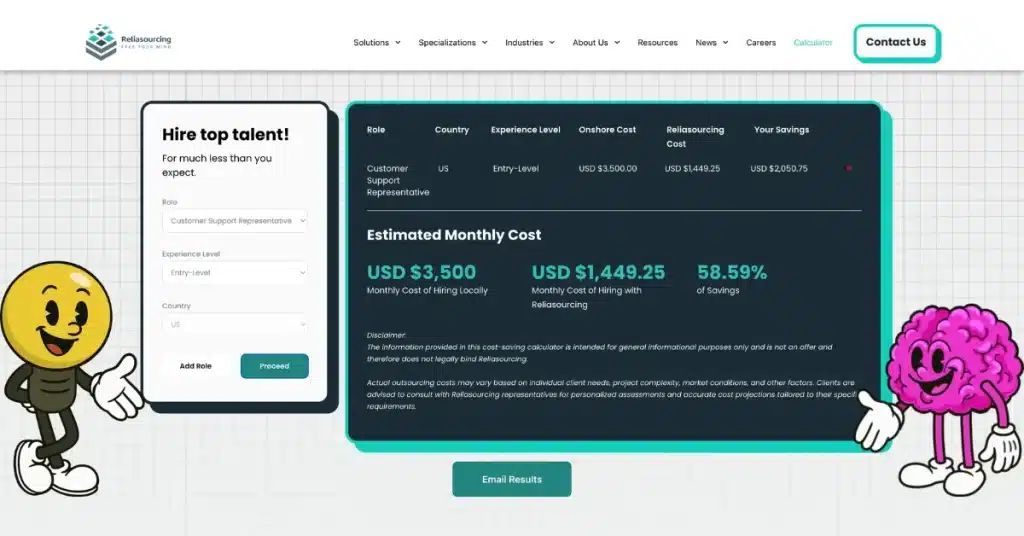
Frequently Asked Questions
What are the best customer service tasks to outsource in eCommerce?
The best customer service tasks to outsource in eCommerce are high-volume, repetitive interactions that consume internal bandwidth, which include order tracking, returns and refunds, live chat inquiries, and product questions. Outsourcing these functions lets your in-house team focus on high-value tasks such as customer research or strategy.
Social media monitoring is another area where outsourcing adds value. Trained teams can respond quickly to public comments and direct messages, protecting your brand reputation in real time.
When should an eCommerce company consider outsourcing?
An eCommerce company should consider outsourcing when:
- Customer inquiries consistently exceed in-house capacity.
- Response times begin slipping, leading to negative reviews.
- Seasonal surges overwhelm existing staff.
- The business is expanding into new markets requiring 24/7 or multilingual support.
In short, outsourcing is the right move when customer service begins to hinder growth rather than support it.
Is eCommerce customer service outsourcing cost-effective for small businesses?
Yes. eCommerce customer service outsourcing is cost-effective for small businesses since they often can’t afford to hire full-time staff for round-the-clock coverage. Outsourcing allows them to “right-size” support by starting with just a few agents, scaling as demand grows, making professional-grade support accessible without the overhead of building an in-house team.
How does outsourcing help online businesses manage peak seasons?
Outsourcing helps online businesses manage peak seasons by providing elastic capacity. Providers can rapidly add trained agents to absorb surges in volume, ensuring no customer is left waiting. This prevents lost sales from abandoned carts or delayed responses during critical shopping periods.
How do I maintain control and visibility over outsourced customer interactions?
A business owner can maintain control and visibility over outsourced customer interactions through platforms like Zendesk, Salesforce, and Gorgias, which provide businesses with real-time dashboards showing ticket volumes, response times, CSAT scores, and agent productivity. Regular reporting and alignment meetings ensure you retain complete control over customer experience.
Do customer issues take longer to resolve if handled by an outsourced team?
No. Customer issues do not take longer to resolve if handled by an outsourced team. Properly trained outsourced teams often resolve issues faster because they specialize in eCommerce workflows. Automation tools handle repetitive inquiries, while knowledge bases ensure agents have immediate access to accurate information. As a result, resolution times are typically shorter than those of in-house teams working without the same level of resources.
Reliasourcing: Your Partner for eCommerce Customer Service
Reliasourcing is a growth partner for eCommerce businesses. With a track record of improving CX while boosting revenue, Reliasourcing delivers results that extend beyond service efficiency.
eCommerce Services Offered
- Live chat, voice, and email support.
- Social media customer engagement.
- Technical troubleshooting and product guidance.
- Seasonal hiring solutions for surges.
Proven Results
- CSAT scores above and across industry benchmarks.
- Escalations reduced by more than half with a Fast Fashion client.
- Millions of dollars in upsell and retention revenue generated.
Reliasourcing’s blend of global talent, advanced tech stack, and tailored strategies makes it an ideal partner for eCommerce brands looking to scale sustainably.
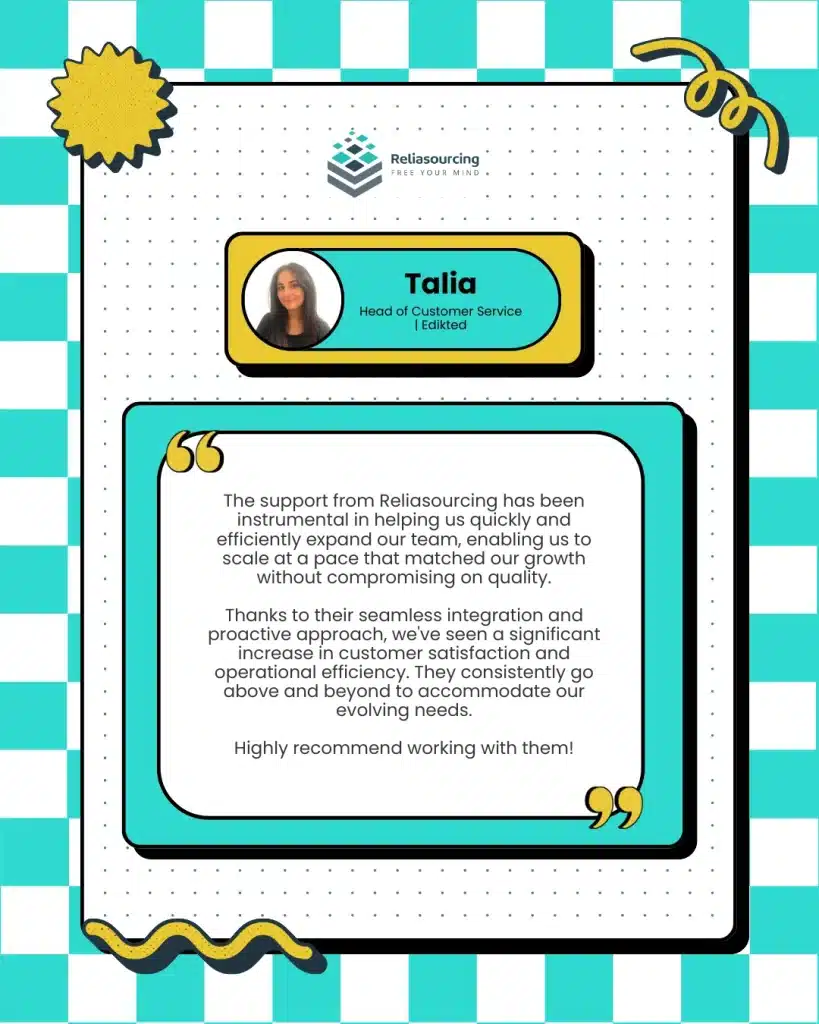
Ready to transform your CX into a growth engine? Book a consultation with Reliasourcing and start building a customer support model that scales alongside your ambitions.
Summary: Elevating eCommerce Growth Through Smart Outsourcing
Customer service has become the gear that drives loyalty, retention, and growth in eCommerce. However, delivering high-quality service at scale is challenging for in-house teams burdened by rising costs and seasonal volatility.
Outsourcing offers a solution by leveraging skilled agents, advanced tools, and scalable operations. eCommerce businesses can deliver consistent, 24/7 service that keeps customers loyal while driving revenue, and establishing strategic partnerships with trusted outsourcing partners like Reliasourcing demonstrates how outsourcing transforms CX into a measurable catalyst for growth.
For businesses navigating rapid growth, the path is clear: build a customer experience framework that scales with your goals.

